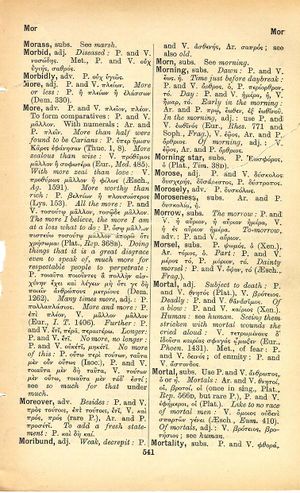mortal: Difference between revisions
οὐδ' ἄμμε διακρινέει φιλότητος ἄλλο, πάρος θάνατόν γε μεμορμένον ἀμφικαλύψαι → nor will anything else divide us from our love before the fate of death enshrouds us (Apollonius of Rhodes, Argonautica 3.1129f.)
(2) |
m (Woodhouse1 replacement) |
||
| Line 1: | Line 1: | ||
{{Woodhouse1 | {{Woodhouse1 | ||
|Text=[[File:woodhouse_541.jpg|thumb|link={{filepath:woodhouse_541.jpg}}]] | |Text=[[File:woodhouse_541.jpg|thumb|link={{filepath:woodhouse_541.jpg}}]] | ||
===adjective=== | |||
[[subject to death]]: [[prose|P.]] and [[verse|V.]] [[θνητός]] ([[Plato]]), [[verse|V.]] [[βρότειος]]. | |||
[[deadly]]: [[prose|P.]] and [[verse|V.]] [[θανάσιμος]]. | |||
Met., | |||
of a [[blow]]: [[prose|P.]] and [[verse|V.]] [[καίριος]] ([[Xenophon|Xen.]]). | |||
Use P. and V. [[ἄνθρωπος]], ὁ or ἡ. | |||
[[human]]: see [[human]]. | |||
[[seeing them stricken with mortal wounds she cried aloud]]: [[verse|V.]] [[τετρωμένους δ' ἰδοῦσα καιρίας σφαγὰς ᾤμωξεν]] ([[Euripides|Eur.]], ''[[Phoenissae]]'' 1431). | |||
Met., of [[fear]]: [[prose|P.]] and [[verse|V.]] [[δεινός]]; of [[enmity]]: [[prose|P.]] and [[verse|V.]] [[ἄσπονδος]]. | |||
===substantive=== | |||
Use [[prose|P.]] and [[verse|V.]] [[ἄνθρωπος]], ὁ or ἡ. | |||
[[mortals]]: [[Aristophanes|Ar.]] and [[verse|V.]] [[θνητοί]], οἱ, [[βροτοί]], οἱ (once in sing., [[Plato]], ''[[Republic]]'' 566D, but rare [[prose|P.]]), [[prose|P.]] and [[verse|V.]] [[ἐφήμεροι]], οἱ ([[Plato]]). | |||
[[like to no race of mortal men]]: [[verse|V.]] [[ὅμοιος οὐδενὶ σπαρτῶν γένει]] ([[Aeschylus|Aesch.]], ''[[Eumenides]]'' 410). | |||
of [[mortal]]s, adj.: [[verse|V.]] [[βρότειος]], [[βροτήσιος]]; see [[human]]. | |||
}} | }} | ||
{{esel | {{esel | ||
|sltx=[[ἀναιρετικός]], [[δυσαλθής]], [[βρότειος]], [[βροτήσιος]], [[βρότεος]], [[βροτός]], [[γηγενής]], [[δηλητηριώδης]], [[ἄφυκτος]], [[ἀποδημητικός]] | |sltx=[[ἀναιρετικός]], [[δυσαλθής]], [[βρότειος]], [[βροτήσιος]], [[βρότεος]], [[βροτός]], [[γηγενής]], [[δηλητηριώδης]], [[ἄφυκτος]], [[ἀποδημητικός]] | ||
}} | }} | ||
Revision as of 08:50, 20 May 2020
English > Greek (Woodhouse)
adjective
subject to death: P. and V. θνητός (Plato), V. βρότειος.
of a blow: P. and V. καίριος (Xen.).
seeing them stricken with mortal wounds she cried aloud: V. τετρωμένους δ' ἰδοῦσα καιρίας σφαγὰς ᾤμωξεν (Eur., Phoenissae 1431).
Met., of fear: P. and V. δεινός; of enmity: P. and V. ἄσπονδος.
substantive
Use P. and V. ἄνθρωπος, ὁ or ἡ.
mortals: Ar. and V. θνητοί, οἱ, βροτοί, οἱ (once in sing., Plato, Republic 566D, but rare P.), P. and V. ἐφήμεροι, οἱ (Plato).
like to no race of mortal men: V. ὅμοιος οὐδενὶ σπαρτῶν γένει (Aesch., Eumenides 410).
of mortals, adj.: V. βρότειος, βροτήσιος; see human.
Spanish > Greek
ἀναιρετικός, δυσαλθής, βρότειος, βροτήσιος, βρότεος, βροτός, γηγενής, δηλητηριώδης, ἄφυκτος, ἀποδημητικός

